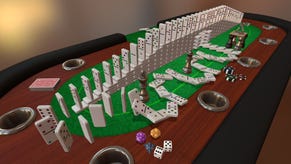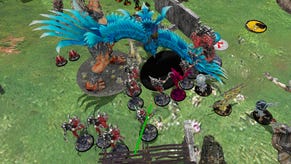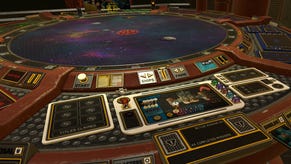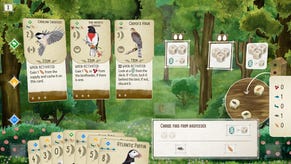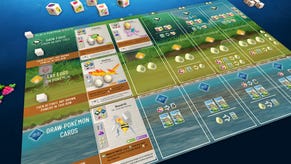Digital board games don’t match the physical experience - and that can be a good thing
Some tabletop games aren’t the same when you can’t touch their bits and pieces... or are they?
Tabletop Simulator has been quite a godsend for board game fans and roleplayers alike. Generally, for its ability to connect players over long distances with games that typically require being in the same place as each other, and currently, because of COVID-19. Were it not for the digital board game sandbox a vast majority of people in locked-down countries just wouldn’t get to play most board games for a chunk of this year. It boasts a lot of incredibly useful and streamlined features, offering not only a set of classic parlour games and official DLC including Scythe, Wingspan and Boss Monster, but a wealth of community-made recreations of other board games in its Steam workshop too.
One of those workshop games is a virtual version of crokinole, a dexterity game from Ontario, Canada that’s over a century old. The problem is: if you haven’t played crokinole on a real, wooden board with its pucks and gliss powder and one-buttcheek-on-the-chair-at-all-times rule and the uncertainty over how hard to push or flick or nudge... I’d find it difficult to tell you whether or not you should play this. On Tabletop Simulator, it’s no use but as a quick fix between real games for me and all the other crokinole fanatics. To newcomers, it’d be like if you watched Les Mis with the volume turned down. Being able to touch crokinole’s bits and pieces is, in my opinion, almost essential to the experience. Right?
To prove this point, myself and a friend of mine - someone who had not played or even heard of crokinole before - sat down one evening to play a digital match. Explaining how everything worked was relatively straightforward, save a bit of wrangling with Tabletop Simulator’s physics engine. They enjoyed the experience, but agreed they’d probably enjoy it even more if they were physically flicking the pucks, and looked forward to playing the physical version of crokinole one day. After all of this.
But there are a lot of things that don’t necessarily require physical involvement to enjoy. Take football, for instance. It’s absolutely massive here in the UK. But not everybody who loves football is out there every weekend having a kickabout with their friends. Some just enjoy watching the sport and supporting their team. Others play video games like FIFA, getting their football fix in the digital realm. Arguably, they’re missing out on a core part of football, but does that mean their enjoyment of it is diminished and incomplete in some way?
Crokinole is still a competitive challenge whether or not you’re actually touching all of its components, and the social aspect of exchanging witty banter with your teammate or opposing players doesn’t necessitate being sat in front of a physical board.
Let’s go back to that Les Mis comparison. On the surface, an argument like that holds up pretty well. But there’s a good chunk of people for whom the volume on Les Mis is perpetually turned down. Deaf people. Whether through circumstances of birth or future medical complications, lots of folks aren’t wholly able to engage with a so-called “essential” part of the musical experience. And, while some theatres provide sign language translators, there isn’t really much in the way of making experiences like that more accessible for people.
Yet Les Miserables has an atmosphere to it, the characters have a lot of depth and, despite pretty much all of it being sung, there’s still a fully-fledged story behind the music. Likewise, crokinole is still a competitive challenge whether or not you’re actually touching all of its components, and the social aspect of exchanging witty banter with your teammate or opposing players doesn’t necessitate being sat in front of a physical board.
What’s to say we can’t offer that accessibility with tabletop games? Something like Tabletop Simulator does exactly that, making an otherwise inaccessible experience available to even more people. If your circumstances mean you have limited mobility, not only might you struggle with a physical game of crokinole, but you could also struggle to leave the house and visit a game shop or a friend’s house if you don’t own a board yourself. Just getting hold of a crokinole board at all can be difficult if you don’t have a lot of money or enough friends to chip in; a full-size board will set you back just shy of €300.
Maybe the tactile feedback of crokinole is a big part of it, but that doesn’t mean playing it virtually can’t be as fun or as valid for some as playing it physically for others.
Digitally, though? It won’t be a solution for everyone, but manipulating a mouse can be a lot easier to do for some people than leaning on your butt and flicking a wooden puck, and there are peripherals that a few folks use in place of mice if their mobility is severely limited. It’s a hell of a lot cheaper, too. At £15, Tabletop Simulator is 5.68% of the price of a crokinole board, and that doesn’t even factor in the cost of shipping. There’s also something Tabletop Simulator makes infinitely more possible over its physical counterpart: you can play online with your friends, without having to be in the same physical space as them.
Tabletop Simulator and, indeed, even crokinole are playable on the internet. Not only is that a really great thing for people for whom expensive and dexterity-focused games like crokinole are inaccessible, it’s great for everyone else who can’t go outside. Maybe the tactile feedback of crokinole is a big part of it, like the music in Les Miserables or the footballing in football - but that doesn’t mean playing it virtually can’t be as fun or as valid for some as playing it physically for others.




